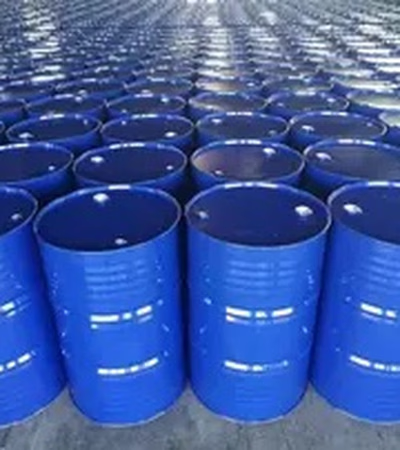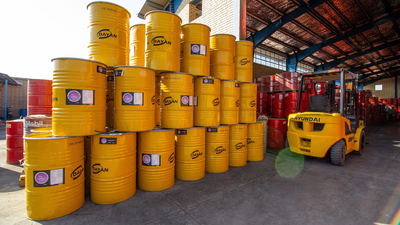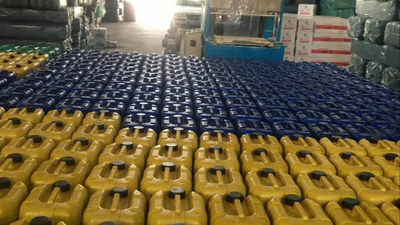
How does B2B trade impact commodity markets like base oil in West Asia?
Base oil, a fundamental raw material in the production of lubricants such as engine oil, holds significant importance in the Middle Eastern and West Asian commodity trade. Base oil serves as the backbone for various products, including bitumen, paraffin, and petroleum coke, making its trade dynamics critical to regional economic activity. In Southwest Asia, the brokerage of base oil thrives due to a robust network of verified exporters and importers facilitated by B2B marketplaces and trade platforms. These platforms enhance supply chain solutions by enabling direct communication between commercial players and promoting regional product listings. The engine oil market in West Asia underscores the increasing demand for high-quality base oil. The trade trends in this region reflect the growing integration of base oil into broader petroleum-based commodities, such as bitumen and asphalt. Bitumen, essential for road construction, and asphalt are heavily traded in the Middle East, aligning with infrastructure development goals. Similarly, petroleum coke (petcoke), another byproduct, is widely used in industrial applications, with key suppliers and manufacturers concentrated in West Asia.
Paraffin, available in liquid and solid forms, plays a pivotal role in the regional market. Derived from crude oil, its trade is expanding due to its versatile applications, ranging from candle production to industrial coatings. The Middle East and West Asia are evolving into hubs for paraffin intermediaries, further bolstered by efficient supply chain frameworks. Aritral, an AI-powered B2B trade platform, offers verified listings, market insights, and brokerage solutions, supporting commercial players in navigating the complexities of international trade for base oil and related commodities. By leveraging such platforms, businesses gain access to new markets, increased visibility, and streamlined operations in the engine oil and base oil sectors.
-
 Mohammad Javad Baqeri 1 months ago
Mohammad Javad Baqeri 1 months ago Iran
Aluminum, iron and steel, pickles, dried fruits and groceries, saffron and spices, metal waste, gold, tar, dairy products, jam and honey, copper, silv
Iran
Aluminum, iron and steel, pickles, dried fruits and groceries, saffron and spices, metal waste, gold, tar, dairy products, jam and honey, copper, silv
I\m directly in contact with all those suppliers from Iran`Details
-
 Mj Trading 8 months ago
Mj Trading 8 months ago Bahrain
Base Oil
Bahrain
Base Oil
Superior quality: Refined to perfection to achieve maximum efficiency. High viscosity index: Ensures stable performance at varying temperatures. Excel...Details
-
 Moslem Ahmadi 4 days ago
Moslem Ahmadi 4 days ago Iran
Export of vegetables from Iran and import of other goods to Iran in barter or cash
Iran
Export of vegetables from Iran and import of other goods to Iran in barter or cash
Hello Our company is an Iranian supplier and extensively imports and exports food products, minerals, industrial and construction materials We are cur...Details
-
 Amr Elhawary 11 months ago
Amr Elhawary 11 months ago Egypt
Synthetic oils and additives for oils and greases
Egypt
Synthetic oils and additives for oils and greases
I am considering introducing synthetic oils produced in Georgia to Egypt, as Egypt is a large market with many users. This also includes various types...Details
-
 Ahmadreza 5 days ago
Ahmadreza 5 days ago Iraq
Sale of bitumen, diesel and naphtha
Iraq
Sale of bitumen, diesel and naphtha
Bitumen producer with grades 6070 and 5070 in jumbo and bulk diesel producer with different standard naphtha producer with low sulfur and mercaptanDetails
-
 Karaveli Petrol Urunleri Ltd Sti 11 months ago
Karaveli Petrol Urunleri Ltd Sti 11 months ago Turkey
petroleum products, urea, sulfur, aluminium zinc
Turkey
petroleum products, urea, sulfur, aluminium zinc
petroleum products urea sulfur gasoline diesel crude oil aluminium zinc copperDetails
-
 Yasir 12 months ago
Yasir 12 months ago Yemen
Precious Stones
Yemen
Precious Stones
I have relied on GodDetails
-
 Gplus 15 months ago
Gplus 15 months ago Turkey
Gplus (G+)
Turkey
Gplus (G+)
Gplus is an oil production company established in 2021 and has obtained a mineral oil production license. It continues its production in its facilitie...Details
-
 Arbenco Petrochemical Company 17 months ago
Arbenco Petrochemical Company 17 months ago Bahrain
I have 50 thousand tons of methanol. Do you buy or do I have a customer for them?
Bahrain
I have 50 thousand tons of methanol. Do you buy or do I have a customer for them?
For sale: 50 thousand barrels of methanol, phone number: 0097339211616Details
-
Exploring Base Oil Trade in the Middle East and West Asia

Base oil, a fundamental raw material in the production of lubricants such as engine oil, holds significant importance in the Middle Eastern and West Asian commodity trade. Base oil serves as the backbone for various products, including bitumen, paraffin, and petroleum coke, making its trade dynamics critical to regional economic activity. In Southwest Asia, the brokerage of base oil thrives due to a robust network of verified exporters and importers facilitated by B2B marketplaces and trade platforms. These platforms enhance supply chain solutions by enabling direct communication between commercial players and promoting regional product listings. The engine oil market in West Asia underscores the increasing demand for high-quality base oil. The trade trends in this region reflect the growing integration of base oil into broader petroleum-based commodities, such as bitumen and asphalt. Bitumen, essential for road construction, and asphalt are heavily traded in the Middle East, aligning with infrastructure development goals. Similarly, petroleum coke (petcoke), another byproduct, is widely used in industrial applications, with key suppliers and manufacturers concentrated in West Asia.
Paraffin, available in liquid and solid forms, plays a pivotal role in the regional market. Derived from crude oil, its trade is expanding due to its versatile applications, ranging from candle production to industrial coatings. The Middle East and West Asia are evolving into hubs for paraffin intermediaries, further bolstered by efficient supply chain frameworks. Aritral, an AI-powered B2B trade platform, offers verified listings, market insights, and brokerage solutions, supporting commercial players in navigating the complexities of international trade for base oil and related commodities. By leveraging such platforms, businesses gain access to new markets, increased visibility, and streamlined operations in the engine oil and base oil sectors.
-
Bitumen and Asphalt Trade Insights in West Asia

Bitumen, commonly referred to as asphalt, plays a critical role in the commodity trade dynamics of West Asia and the Middle East. Derived from crude oil, bitumen serves as a key material in road construction and industrial applications. The Middle East, known for its rich petroleum reserves, is a significant player in the global bitumen market. The trade of bitumen and related petroleum products, such as base oil, paraffin, and petroleum coke, is facilitated by advanced B2B marketplaces and supply chain solutions. These platforms help verified exporters and importers connect efficiently, ensuring reliable transactions and optimized logistics. In the engine oil sector, bitumen and base oil are integral as raw materials. The demand for engine oil across West Asia has grown due to the region"s expanding automotive industry. B2B trade platforms provide market insights, regional product listings, and direct communication channels, allowing businesses to explore trends in engine oil trade.
Base oil, a primary component of engine oil, also sees robust demand, with its trade dynamics influenced by factors like pricing, quality, and supplier reliability. Petroleum coke, another derivative, is essential for industries such as cement and power generation. Manufacturers and suppliers across West Asia benefit from trade advertising platforms that boost visibility and networking opportunities. Similarly, paraffin, available in both liquid and solid forms, is widely used in packaging, pharmaceuticals, and cosmetics. Its trade in West Asia is supported by intermediaries specializing in regional logistics and market intelligence. Aritral, an AI-driven B2B trade platform, simplifies these transactions by offering tools like product listing, direct communication, and AI-powered marketing. This digital ecosystem enhances transparency, reduces barriers, and fosters growth in the Middle East commodity market. "
-
Engine Oil Trade Dynamics in West Asia and Middle East

Engine oil, a critical lubricant for automotive and industrial machinery, plays a vital role in ensuring efficient performance and durability. In West Asia and the Middle East, the engine oil market is heavily influenced by regional trade dynamics, with strong ties to the petroleum industry. The trade of base oil—a primary component of engine oil—and its derivatives such as bitumen, paraffin, and petroleum coke, serves as the backbone for many regional import/export activities. West Asia is a hub for engine oil production and distribution, with verified exporters and importers utilizing B2B marketplaces to connect with buyers across Asia. Platforms specializing in commodity trade within the Middle East offer regional product listings and market insights, fostering business networking opportunities. These tools are crucial for understanding the nuances of engine oil quality, pricing, and types, which vary based on viscosity grades and applications in cars, heavy-duty vehicles, and industrial machinery. Base oil, the foundation for manufacturing engine oil, is brokered extensively in Southwest Asia. Key players in the region ensure a steady supply chain for production facilities, with trade advertising platforms promoting transparency and verified transactions.
Similarly, bitumen and petroleum coke markets in West Asia are significant for road construction and industrial energy needs, with competitive pricing influenced by global crude oil trends. Paraffin, another petroleum byproduct, is vital for both solid and liquid applications. Its trade in the Middle East intersects with broader commodity flows, emphasizing the importance of intermediaries who bridge supply-demand gaps. Aritral, an AI-driven B2B platform, simplifies the trade of engine oil and its components, providing services like product listing, AI-powered marketing, and direct communication tools to support global sales. With verified profiles, Aritral fosters trust and efficiency, enabling businesses to capitalize on the robust trade opportunities in West Asia"s oil-based industries. "
-
Paraffin Trade Insights in West Asia and the Middle East

The paraffin trade in West Asia and the Middle East has emerged as a significant commodity market, driven by its diverse applications in industries such as cosmetics, pharmaceuticals, and manufacturing. Paraffin, derived primarily from petroleum, comes in both liquid and solid forms, categorized under types like paraffin wax (HS Code 271290) and paraffin oil (HS Code 271210). West Asia’s extensive petroleum reserves make it a global hub for paraffin production, with verified exporters and importers leveraging regional B2B marketplaces to facilitate trade. Commodity-focused platforms in the Middle East, such as Aritral, have simplified international trade by offering supply chain solutions and verified listings of paraffin products. These platforms enable businesses to access market insights, streamline logistics, and build robust business networks. Liquid paraffin, commonly used in pharmaceuticals, and solid paraffin, prevalent in candle-making and coatings, are highly demanded across Asia. The paraffin market intertwines with other petroleum-based commodities like base oil, bitumen, and petroleum coke. Base oil, a precursor to engine oil, is essential in lubricant production, while bitumen dominates the construction sector.
These interconnected markets benefit from B2B advertising platforms that enhance visibility and trust among regional stakeholders. The rise of AI-driven trade solutions further impacts commodity markets in West Asia, ensuring transparency and efficiency in paraffin and other petroleum derivatives. B2B marketplaces foster direct communication between manufacturers and buyers, promoting high-quality paraffin production and distinguishing premium-grade paraffin from substandard variants. West Asia’s trade landscape continues to evolve, emphasizing the role of verified exporters and importers in shaping global supply chain dynamics. Aritral, as an AI-powered B2B platform, exemplifies how digital tools transform commodity trading in the region, offering services like product listings, marketing insights, and global sales assistance to streamline paraffin and related markets.
-
Petroleum Coke Trade Insights in West Asia

Petroleum coke (Petcoke), a solid carbon-rich material derived from oil refining, plays a vital role in commodity trade across West Asia and the Middle East. The region is a significant producer of petcoke, with its production driven by the abundance of crude oil and advanced refining capacities. Middle Eastern petcoke, also known as petroleum coal, is utilized in industries such as cement, steel, and aluminum, owing to its high calorific value and cost-effectiveness compared to traditional fuels. However, its environmental impact and fluctuating market prices remain challenges. B2B marketplaces in Asia, including platforms like Aritral, are transforming the trade dynamics of petcoke and related commodities such as engine oil, base oil, bitumen, and paraffin. Verified exporters and importers on these platforms provide streamlined supply chain solutions, ensuring reliable and transparent transactions. These trade advertising platforms also offer regional product listings and market insights, enabling businesses to navigate pricing trends and demand fluctuations effectively. The engine oil market, intrinsically linked to base oil, paraffin, and bitumen trade, is similarly impacted by B2B dynamics.
For instance, base oil, a key raw material for engine oil production, sees significant demand in West Asia. Supply chain solutions facilitate its movement across borders, while regional product listings and verified suppliers enhance accessibility. Bitumen and paraffin, essential for construction and industrial applications, also benefit from similar supply chain efficiencies provided by trade platforms. Petroleum coke suppliers in West Asia and petcoke manufacturers in the Middle East are leveraging these platforms to expand their reach. Market insights reveal that West Asia’s production rate of petroleum coke is steadily growing, driven by industrial demand and competitive pricing. As the global commodity trade evolves, businesses must continuously adapt to shifting market dynamics, supported by tools like AI-powered B2B platforms. Aritral offers services such as product listing, direct communication, and AI-powered marketing to enable seamless global trade operations.
-
Consumption of base oil

Base oil is primarily consumed by the lubricant industry, which includes automotive, industrial, marine, and aviation sectors. Its demand is closely linked to lubricant consumption, driven by factors such as industrial growth, vehicle sales, and machinery maintenance. The automotive sector significantly influences base oil demand due to the number of vehicles on the road and their maintenance needs. Industrial activities like manufacturing and construction also rely heavily on lubricants derived from base oil. Base oil is produced through refining crude oil or chemical synthesis and serves as a key raw material for engine oils and industrial lubricants. The production process involves heating crude oil to separate lighter hydrocarbons for fuels while heavier ones are refined into base oils. Additives are incorporated to enhance properties like friction resistance and cleaning capabilities. Market trends indicate a growing shift towards high-performance and environmentally friendly lubricants, affecting specific base oil grades" demand.
Regional variations in industrial activity and economic development influence base oil consumption patterns, with emerging economies experiencing increased demand due to rapid urbanization. Additionally, recycling processes for used lubricants are gaining traction, providing sustainable alternatives that may impact virgin base oil demand. "
-
What is base oil?

Base oil is a crucial component in the formulation of lubricants, primarily derived from refined petroleum. It constitutes over 95% of most lubricants, including motor oils and hydraulic fluids. The refining process yields base oils with desirable properties such as high viscosity index, thermal stability, and oxidation resistance, which are essential for reducing friction and protecting machinery. Base oils can be categorized into five groups by the American Petroleum Institute (API), ranging from less refined to specialty oils. While most base oils are petroleum-based, synthetic alternatives like polyalphaolefins and esters are gaining popularity due to their superior performance in extreme conditions. The increasing reliance on base oil in lubricant efficiency highlights its significance in the industry.
-
Production of base oils in West Asia (Middle East)

West Asia, particularly the Middle East, is a crucial hub for base oil production due to its vast crude oil reserves and advanced refining infrastructure. Saudi Arabia leads the region with its extensive refining capabilities, primarily through Saudi Aramco, which produces various grades of base oils. The UAE follows closely, with significant contributions from ADNOC and ENOC, focusing on high-quality base oils. Iran also plays a vital role in this sector, leveraging its historical oil production and refining expertise through the National Iranian Oil Company (NIOC). Other countries like Kuwait, Qatar, and Oman are also notable producers, each with their own state-owned entities managing oil production and refining. The region"s strategic location and investments in modern refining technologies ensure a steady supply of base oils to meet both regional and global demands. Base oils produced in West Asia adhere to international certifications such as ISO 9001 and ISO 14001, ensuring quality standards are met. The complexity of producing engine oils involves not just base oils but also various additives that enhance lubrication properties.
As the industry evolves, new standards are being developed to optimize fuel efficiency and reduce engine wear. "
-
History of base oils

Base oils have a rich history dating back to ancient civilizations, where lubricants were derived from animal fats and vegetable oils. The modern era of base oils began in the 19th century with the rise of the petroleum industry, driven by significant oil discoveries and advancements in refining techniques. Initially, crude oil-based lubricants were not favored due to their inferior performance compared to animal-based options. However, as automobile demand surged, manufacturers began optimizing crude oil processing to produce better lubricants. By the early 20th century, engine oils were classified by viscosity, leading to a focus on refining for improved efficiency. The American Petroleum Institute established a classification system for base oils based on refining methods and properties. Over time, innovations such as solvent extraction and hydroprocessing enhanced base oil quality. The introduction of synthetic base oils in the mid-20th century marked a pivotal shift in lubricant technology, offering superior performance for various applications including automotive and industrial uses. Today, ongoing research aims to develop environmentally sustainable base oils that meet modern engine requirements.


















